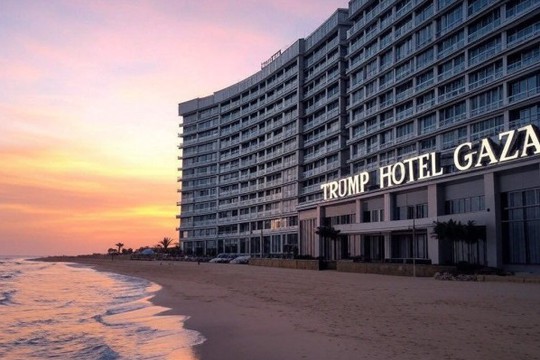Pic.: AI
If Trump was trying to 'shock' the Gulf states into action on Gaza, it backfired tremendously, analysts say, writes ‘Middle East Eye’.
President Donald Trump will apply pressure on Gulf states to bankroll the US’s takeover of the Gaza Strip amid frustration among advisors that the oil-rich allies haven’t coalesced behind the deal or made a counter-offer, a senior US official told Middle East Eye.
“The message is, ‘you don’t get what you want any longer from the US just for free',” the official said.
The Trump administration's plans for Saudi Arabia, Qatar and the UAE to obtain waterfront property rights in a reconstructed Gaza Strip and for their construction firms to be awarded contracts to build apartment towers there would be in return for funding the “relocation” of Palestinians and Gaza’s reconstruction, the official, who was briefed by one of a handful of Trump advisors consulted on the plan, told MEE.
However, it is no small matter that international law dictates those territorial rights, and the US does not control the property rights for Gaza's waterfront or its maritime boundaries.
The world was left guessing whether or not a president who campaigned on ending foreign American entanglements was serious about taking over Gaza or merely setting himself up for negotiation with Gulf states for the enclave’s postwar future and, in the case of Saudi Arabia, normalisation of ties with Israel.
Trump has been calling for weeks for neighbouring Arab states, Jordan and Egypt, to accept forcibly displaced Palestinians from the Gaza Strip. His own State Department has warned him that Egypt will not be swayed.
Likewise, Saudi Arabia has struck a hard public line on what it would take to get them to provide funds for Gaza’s reconstruction.
Asked in an interview in January if Saudi Arabia would fund Gaza’s reconstruction, Prince Khalid bin Bandar bin Sultan Al Saud, Saudi Arabia’s ambassador to the UK, said: “To reconstruct a Palestinian state, yes. To reconstruct a territory that the Israelis might just destroy again in a matter of years, I don’t think that would be a sensible thing to do.”
Trump said on Tuesday that after emptying Gaza of Palestinians and taking a “long-term ownership position” of the territory, the US would turn it into the "Riviera of the Middle East”.
“This might lead to a negotiation, but I take Trump seriously. He and his people really believe this is the best path forward. I’m not surprised they are upset the Gulf is not on board,” Jonathan Panikoff, a former senior US intelligence official now at the Atlantic Council, told MEE.
But it may be the cold shoulder it received from the US’s Arab Gulf partners that is grating the White House the most. Trump insisted on Tuesday that his vision would be “paid for by neighbouring countries of great wealth”.
Emirati analyst Abdulkhaleq Abdullah, who has close ties to the UAE’s ruling Nahyan family, wrote on X: “We have just heard the most stupid idea come out of Washington DC regarding Gaza,” after Trump’s speech.
The plan was shot down by Saudi Arabia, which rushed out a statement early on Wednesday morning that rejected any efforts to displace Palestinians from their land.
It also upped Saudi Arabia’s demand that an independent Palestinian state be created before it normalises diplomatic relations with Israel.
The language, which said the Saudi position was nonnegotiable, marked a step up from previous statements that called for a pathway to a Palestinian state as a prerequisite to a deal.
“The Gulf isn’t pumping any cash into the Gaza Strip in the absence of a serious conversation on a two-state solution and, secondly, the fate of the current ceasefire,” Bilal Saab, a former Pentagon official in the first Trump administration, told MEE.
Anna Jacobs, a Middle East expert at the Arab Gulf States Institute in Washington DC, said that Gulf states had made it “crystal clear” to Trump that his statements on Gaza were a non-starter.
“They are not going to pay for the forced displacement of Palestinians,” she said.
The outpouring of criticism included the Arab League, which called Trump's proposal a "recipe for instability”.
Kristian Coates Ulrichsen, a fellow for the Middle East at Rice University's Baker Institute, said that, far from moving the needle in negotiations with the Gulf states about funding Gaza’s reconstruction, Trump may have caused them to harden their positions.
President Trump said on Monday that he could cut aid to Jordan and Egypt if they refused his demand to permanently take in most Palestinians from Gaza, substantially increasing the pressure on key allies in the region to back his audacious proposal to relocate the entire population of the territory in order to redevelop it.
The president also said from the White House that if Hamas did not release all the remaining Israeli hostages by “12 o’clock on Saturday,” the cease-fire agreement with Israel should be canceled.
“All hell is going to break out,” Mr. Trump said to reporters in the Oval Office, while acknowledging that the choice over ending the cease-fire ultimately fell to Israel.
Jordan and Egypt, both major recipients of U.S. military and economic aid, have rejected any suggestion that Palestinians be relocated to their countries. But Mr. Trump said on Monday that the assistance could be in jeopardy.
“If they don’t agree, I would conceivably withhold aid,” he told reporters in response to a question a day before a meeting with King Abdullah II of Jordan.
read more in our Telegram-channel https://t.me/The_International_Affairs

 12:05 12.02.2025 •
12:05 12.02.2025 •























